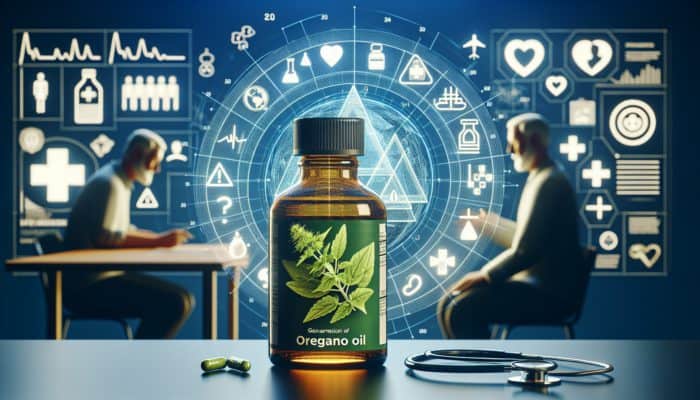Explore the Intriguing Historical Journey of Oregano in the UK
Ancient Herbal Medicine: Oregano's Role in Traditional Remedies

Oregano boasts a fascinating historical significance within the UK, treasured not only for its culinary applications but also for its remarkable medicinal properties. Over centuries, this herb has been revered for its effectiveness in treating a myriad of ailments, particularly infections and wounds. Historical documentation indicates that oregano has been employed in various capacities throughout the ages. Some notable uses include:
- Alleviating respiratory ailments by crafting soothing infusions to relieve coughs and colds.
- Formulating poultices for injuries to prevent infections and promote healing.
- Supporting digestion and alleviating stomach discomfort through the herb's beneficial effects.
- Consuming oregano-infused teas to combat urinary tract infections.
These historical applications highlight oregano's longstanding association with health and wellness in the UK. Ancient herbalists revered oregano not only for its distinctive flavour but also for its capacity to promote healing and bolster immunity, establishing the foundation for its persistent relevance in modern herbal medicine.
The Significance of Oregano in Traditional British Healing Practices
Oregano has long been an essential element of traditional British medicine, particularly celebrated for its impressive antibacterial properties. Herbal practitioners historically crafted teas and tinctures from oregano to harness its therapeutic potential. One classic preparation involves steeping dried oregano leaves in boiling water for approximately ten minutes before straining the infusion. This remedy is well-regarded for alleviating cold and flu symptoms, showcasing the herb's versatility in natural healing.
Additionally, another traditional method includes creating a tincture by immersing oregano leaves in high-proof alcohol for several weeks. Consuming this tincture in small doses has been known to support digestive health and fortify the immune system. The wisdom surrounding these herbal remedies has been passed down through generations, with many contemporary herbalists continuing to endorse these practices as effective treatments for a range of health concerns.
The Evolution of Oregano's Uses Through the Ages
The application of oregano in the UK has evolved significantly over the past century. Initially rooted in traditional herbal medicine, its uses have broadened alongside advancements in scientific research. In the early 1900s, herbalists primarily relied on anecdotal evidence to advocate the benefits of oregano for various health issues. However, with the progression of modern medicine, our comprehension of oregano's antibacterial properties has expanded considerably.
Today, oregano's applications extend well beyond home remedies; it has emerged as a vital ingredient in contemporary health and wellness products. The surge in popularity of essential oils, supplements, and extracts has been driven by an increasing interest in natural health solutions. An expanding body of research supporting oregano's effectiveness has solidified its status as a valuable herb in both culinary and medicinal contexts, successfully bridging the gap between traditional knowledge and modern innovations.
Expert Perspectives on the Antibacterial Properties of Oregano

Expert Opinions on Oregano's Efficacy in the UK
Leading experts in herbal medicine throughout the UK strongly recommend the use of oregano as a natural antibacterial agent. They underscore its effectiveness against a variety of bacterial strains, solidifying its utility as a beneficial resource in both clinical and domestic environments. For example, a study conducted by a renowned herbalist in London demonstrated that oregano oil significantly reduced bacterial counts in samples taken from infected wounds.
Healthcare settings are increasingly integrating oregano into treatment protocols, particularly for patients seeking alternatives to conventional antibiotics. The herb's efficacy against bacterial strains such as *E. coli* and *Staphylococcus aureus* is particularly acknowledged, leading healthcare providers to recommend its use alongside traditional treatments. This fusion of traditional wisdom and modern scientific discoveries highlights oregano's potential as a frontline defence against bacterial infections.
Optimal Methods for Using Oregano for Maximum Efficacy
To harness oregano's antibacterial properties effectively, careful consideration must be given to dosage and application methods tailored for UK residents. Experts propose several strategies to optimise its benefits, including:
- Incorporating fresh or dried oregano into daily meals to benefit from its antibacterial properties.
- Using diluted oregano oil mixed with a carrier oil for topical applications on minor cuts or abrasions.
- Brewing oregano-infused herbal teas to enhance immunity and support digestive health.
- Opting for oregano supplements while adhering to the recommended dosages indicated on product labels.
Effective usage also requires an understanding of the herb's potency. For instance, oregano oil is often significantly more concentrated than dried oregano; therefore, it should be utilised with caution. Standard recommendations advise blending a few drops of oregano oil with a carrier oil for topical use or taking one to two capsules of oregano extract daily as a supplement. This comprehensive approach ensures that users can reap the benefits of oregano while minimising potential side effects.
Potential Side Effects and Considerations Associated with Oregano Usage

While oregano is widely regarded as safe for most individuals, UK health professionals advise caution regarding potential side effects. These can include mild digestive discomfort, allergic reactions, or interactions with certain medications. For instance, oregano may potentiate the effects of anticoagulants, necessitating careful monitoring for those on blood thinners.
To minimise these risks, it is advisable to start with small doses, especially when using oregano oil or supplements. Consulting with a qualified healthcare professional can further ensure safe usage, particularly for individuals with pre-existing health conditions or those who are pregnant. Being aware of these considerations is crucial for reaping the benefits of oregano without compromising one’s health.
Current Research Findings on Oregano's Antibacterial Effectiveness
A plethora of studies conducted by UK research institutions has substantiated the antibacterial efficacy of oregano. Significant findings illustrate that compounds found in oregano, such as carvacrol and thymol, exhibit robust antibacterial properties against various pathogenic bacteria, particularly those commonly associated with foodborne illnesses.
A noteworthy study highlighted oregano oil's ability to inhibit the growth of *Salmonella* and *Listeria*, positioning it as a promising candidate for enhancing food safety. These results hold significant implications for UK healthcare practices, particularly within the realms of food hygiene and infection control. An ever-expanding body of evidence supports the integration of oregano into strategies aimed at reducing bacterial infections, both in culinary applications and clinical settings.
Comprehensive Insights into Cultivating Oregano in the UK
Identifying the Ideal Growing Conditions for Oregano
Oregano thrives in the temperate climate of the UK, flourishing in well-drained soil while requiring ample sunlight. This herb prefers a pH range of 6.0 to 8.0, making it essential for UK gardeners to assess their soil conditions prior to planting. Full sun exposure is crucial for optimal growth, as oregano plants necessitate a minimum of six hours of direct sunlight each day.
Additionally, oregano benefits from a sheltered environment, as excessive wind or frost can impede its development. The timing of planting is equally critical; spring or early autumn are ideal periods for sowing seeds or taking cuttings. Understanding these growing conditions empowers UK gardeners to cultivate robust oregano plants that yield high-quality leaves suitable for culinary and medicinal applications.
Best Practices for Successful Oregano Cultivation in the UK
Successfully cultivating oregano in UK gardens requires adherence to a set of best practices. Correct planting techniques, in conjunction with ongoing care, are vital for achieving a plentiful harvest. Implementing the following recommendations can greatly enhance the quality of growth:
- Begin with healthy seedlings or well-established cuttings to foster vigorous growth.
- Water the plants consistently while avoiding waterlogging; oregano thrives in dry conditions once established.
- Regularly prune the plants to encourage bushy growth and prevent overcrowding.
- Utilise organic compost to enrich the soil, providing essential nutrients without relying on chemical additives.
These practices not only improve the quality of oregano but also promote sustainable gardening. By being attentive to environmental factors and soil health, UK gardeners can cultivate oregano that is both flavourful and beneficial for health applications.
Effective Harvesting and Storage Techniques for Oregano
Proper harvesting and storage methods for oregano are crucial for preserving its antibacterial properties. The optimal time to harvest oregano is just before it flowers, as this is when its essential oils are most concentrated. Gardeners should employ sharp scissors to cut stems, leaving a few inches above the ground to encourage regrowth.
After harvesting, oregano can be dried to maintain its flavour and medicinal benefits. UK gardeners should hang oregano bundles upside down in a cool, dark, and dry area, ensuring adequate air circulation. Once dried, the leaves can be crumbled and stored in airtight containers, ideally in a cool, dark space to shield them from light and moisture. This method guarantees that the antibacterial properties remain intact, making the herb ready for use in both culinary and medicinal applications.
Managing Common Pests and Diseases in Oregano Gardens in the UK
Cultivating oregano in the UK may present challenges from common pests and diseases, necessitating diligent attention from gardeners. Aphids, spider mites, and whiteflies are prevalent pests that can undermine plant health. To prevent infestations, regular inspections and maintaining healthy plant conditions are essential.
Diseases such as powdery mildew can arise in humid environments, particularly if air circulation is inadequate. Employing organic fungicides or enhancing airflow in the garden can effectively manage this issue. Additionally, implementing crop rotation and planting companion plants can naturally deter pests, minimising the need for chemical interventions. By adopting these strategies, UK gardeners can safeguard their oregano from common threats, ensuring a thriving crop.
Seasonal Care Techniques for Oregano in the UK
Seasonal care is vital for ensuring the wellbeing of oregano throughout the year in the UK. During winter, it is essential to protect oregano from frost; covering plants with mulch can provide necessary insulation. It is advisable to limit watering during the colder months, as excess moisture can lead to root rot.
In the summer, regular pruning promotes bushier growth, and ensuring adequate water supply during dry spells helps maintain the plant’s vitality. Applying organic compost in early spring bolsters new growth, while maintaining a tidy garden bed enhances airflow and reduces disease risk. Seasonal care practices guarantee that oregano continues to thrive and deliver its culinary and medicinal benefits year-round.
Oregano's Impact on Traditional Culinary Traditions in the UK
Traditional UK Dishes Enhanced by the Unique Flavour of Oregano
In British cuisine, oregano has carved a significant niche by enhancing the flavours of numerous traditional dishes while providing its antibacterial advantages. Oregano is frequently included in recipes for Italian-inspired meals, such as spaghetti Bolognese and pizza, due to its robust flavour profile. It also plays a crucial role in shepherd's pie and various stews, where its aromatic qualities markedly elevate the overall taste.
Furthermore, herb-infused oils, particularly those combining oregano with olive oil, are popular for dressings and marinades, showcasing the herb's versatility. Beyond its culinary applications, incorporating oregano into these dishes not only enhances flavour but also seamlessly integrates its health benefits into daily meals, establishing it as a staple ingredient in UK kitchens.
Oregano's Role in Elevating the Culinary Experience in the UK
Oregano's contribution to UK cuisine transcends mere flavour enhancement; it offers substantial health benefits, particularly owing to its antibacterial properties. The inclusion of oregano in traditional dishes can enrich the nutritional profile, potentially assisting digestion and strengthening the immune system.
Its aromatic compounds not only impart a delightful taste but may also aid in food safety by inhibiting bacterial growth. This aspect is especially crucial in meat-based dishes, where the risk of bacterial contamination poses a concern. By incorporating oregano into meals, UK chefs not only honour culinary traditions but also promote a healthier dining experience, underscoring the herb's vital role in British culinary culture.
Can Oregano Enhance Food Safety in UK Kitchens?
Oregano’s antibacterial properties can significantly bolster food safety in UK kitchens. The herb has demonstrated effectiveness in inhibiting pathogens such as *E. coli* and *Salmonella*, making it a viable choice for minimising bacterial contamination during food preparation.
Incorporating oregano into meat marinades or adding it to sauces provides an extra layer of protection against harmful bacteria. Moreover, research indicates that oregano oil can function as a natural preservative, extending the shelf life of perishable items. This practical application not only enhances food safety but also aligns with the increasing preference among UK consumers for natural solutions in food preservation.
Research-Backed Insights into Oregano's Antibacterial Properties
Recent Studies Shedding Light on Oregano's Effectiveness
Recent research conducted in the UK has highlighted the impressive antibacterial effectiveness of oregano against various strains of bacteria. Studies indicate that the active compounds in oregano, including carvacrol and thymol, effectively disrupt bacterial cell membranes, leading to cell death.
One pivotal study demonstrated that oregano oil exhibited significant antimicrobial activity against *Staphylococcus aureus*, underscoring its potential for clinical applications. This research reinforces the viability of oregano as a natural alternative in addressing antibiotic resistance, which is an escalating concern within the UK healthcare system. By providing compelling evidence of oregano’s benefits, these studies pave the way for its integration into both culinary practices and health-related contexts.
Comparative Analysis: Oregano Versus Other Antibacterial Agents
When evaluating oregano's antibacterial properties against other natural and synthetic agents, research indicates that it occupies a unique position. Oregano's efficacy is often comparable to that of conventional antibiotics, making it a compelling option for natural health solutions.
Studies have indicated that oregano oil can surpass several common antibacterial agents in inhibiting bacterial growth, particularly against Gram-positive bacteria such as *Staphylococcus* and *Streptococcus*. This relative effectiveness positions oregano as a valuable complementary choice, especially in light of the growing issue of antibiotic resistance. As UK consumers and healthcare providers seek safer alternatives, oregano presents a promising avenue for naturally combating bacterial infections.
Identifying the Bacterial Strains Most Affected by Oregano
Certain bacterial strains exhibit heightened susceptibility to the antibacterial effects of oregano. UK studies have pinpointed key targets, including:
- *Staphylococcus aureus*
- *Escherichia coli*
- *Salmonella enterica*
- *Listeria monocytogenes*
- *Bacillus cereus*
These findings illustrate oregano's potential as a natural remedy for combating specific infections, particularly those linked to foodborne illnesses. This targeted efficacy enhances oregano's appeal as both a culinary ingredient and a medicinal herb, contributing to its increasing popularity in health and wellness discussions across the UK.
Effective Utilisation of Oregano for Antibacterial Purposes
Research in the UK has outlined several practical applications for employing oregano as an antibacterial agent. One effective method involves the use of oregano oil, which can be applied topically for minor infections or incorporated into food preparations.
Integrating oregano into meat marinades not only enhances flavour but also mitigates the risk of bacterial contamination. Additionally, brewing oregano-infused herbal teas can bolster the immune system, providing an internal defence against infections. Recommended dosages for oregano supplements typically range from 200 to 400 mg daily, depending on the intended use. This versatility allows UK residents to effectively utilise oregano in various forms to harness its antibacterial advantages.
Practical Applications of Oregano for Antibacterial Benefits in the UK
Maximising Antibacterial Effects through Oregano Oil
Oregano oil is acknowledged as a potent form of oregano renowned for its antibacterial properties. To maximise its benefits, it is essential to adopt safe and effective methods when utilising oregano oil. One recommended practice involves diluting a few drops of oregano oil with a carrier oil, such as coconut or olive oil, prior to topical application to affected areas.
Ingesting oregano oil should be approached cautiously; encapsulated forms are typically preferable to avoid potential irritation to the digestive system. A common dosage involves one to two capsules per day, depending on the concentration. Furthermore, adding oregano oil to cleaning solutions can amplify antibacterial properties for household applications. By using oregano oil judiciously, UK residents can harness its powerful benefits while minimising potential side effects.
Incorporating Oregano into Daily Routines for Enhanced Health Benefits
Integrating oregano into daily activities can be both simple and beneficial for health. UK residents can implement several practical strategies to ensure they capitalise on the antibacterial properties of this herb:
- Enhance salads and dressings by incorporating fresh or dried oregano for flavour and health benefits.
- Prepare oregano-infused teas to support digestive health and fortify immunity.
- Use diluted oregano oil in a carrier oil for topical applications on minor skin irritations.
- Incorporate oregano into marinades and sauces to improve food safety in meat dishes.
By embracing these practices, individuals can seamlessly integrate oregano into their daily lives, promoting wellness through both culinary enjoyment and health advantages.
Evaluating the Efficacy and Considerations of Oregano Supplements
Oregano supplements have gained popularity in the UK as a convenient means to access the herb's antibacterial properties. The efficacy of these supplements largely depends on their concentration and formulation. Many products on the market contain oregano oil as the active ingredient, standardised for specific active compounds such as carvacrol.
Typical dosages range from 200 to 400 mg per day, but users should always adhere to the instructions provided on the product label. When taken consistently, these supplements can bolster immune function and assist in combating bacterial infections. However, selecting high-quality brands is crucial to ensure safety and effectiveness. By incorporating oregano supplements into their health routines, UK residents can conveniently benefit from the herb’s powerful properties.
Looking Forward: The Future of Oregano in UK Health and Wellness
Emerging Trends in the Utilisation of Oregano
The landscape of oregano use is evolving, accentuating its emerging health benefits, particularly its antibacterial properties. A growing movement towards natural health solutions is propelling interest in oregano as an alternative treatment for infections.
Moreover, the resurgence of herbalism within wellness communities has rekindled interest in traditional remedies, placing oregano at the forefront. As consumers become increasingly inclined to seek holistic approaches to health, oregano is progressively being integrated into dietary supplements, functional foods, and natural skincare products. This trend reflects a broader shift towards embracing natural remedies within the UK's health and wellness landscape.
The Potential Impact of Oregano on Public Health in the UK
Oregano's antibacterial properties hold significant promise for public health initiatives in the UK. By advocating for the use of oregano as a natural alternative for addressing bacterial infections, public health campaigns could motivate individuals to incorporate this herb into their diets and lifestyles.
Furthermore, oregano could play a pivotal role in food safety measures, particularly in educating consumers about its potential to prevent foodborne illnesses. As the challenge of antibiotic resistance escalates, public health strategies might leverage oregano's natural properties to mitigate risks, contributing to a holistic approach to health and wellness across communities in the UK.
The Future of Oregano Research in the UK
Future research in the UK is poised to delve deeper into oregano's antibacterial properties and their implications for health and wellness. Upcoming studies may focus on exploring new applications of oregano in clinical settings, particularly concerning the management of antibiotic-resistant infections.
Additionally, research could investigate the synergistic effects of oregano when combined with other natural agents, potentially leading to innovative therapeutic strategies. The ongoing exploration of oregano's properties not only reinforces its status as a key herb in traditional medicine but also positions it as a crucial player in modern health initiatives, with promising discoveries anticipated in the years ahead.
Frequently Asked Questions About Oregano
What Are the Key Antibacterial Properties of Oregano?
Oregano contains compounds such as carvacrol and thymol, which exhibit potent antibacterial effects against various pathogens, including *E. coli* and *Staphylococcus aureus*.
Is It Safe to Use Oregano Oil Directly on the Skin?
Oregano oil should be diluted with a carrier oil before topical application to prevent skin irritation. Always conduct a patch test prior to widespread use.
How Can I Incorporate Oregano into My Daily Meals?
You can enhance your dishes by adding fresh or dried oregano to salads, sauces, marinades, and soups for both flavour and health benefits.
Are There Any Contraindications for Using Oregano?
Individuals taking blood thinners or those with allergies to oregano should consult a healthcare professional prior to using oregano or oregano oil.
What Is the Best Way to Store Dried Oregano?
Store dried oregano in an airtight container located in a cool, dark environment to preserve its flavour and antibacterial properties.
Can Oregano Assist with Food Preservation?
Indeed, oregano's antibacterial properties make it an effective natural preservative, particularly in meat products and sauces.
What Is the Recommended Method for Taking Oregano Supplements?
Follow the dosage instructions on the supplement label, which typically range from 200 to 400 mg daily, and consult a healthcare professional if you are uncertain.
Is Oregano Safe for Children?
Oregano is generally considered safe for children in culinary amounts, but it's advisable to consult a healthcare professional before using it in medicinal forms.
How Does Oregano Compare to Traditional Antibiotics?
Oregano has demonstrated effectiveness against specific bacteria, making it a promising alternative to antibiotics, particularly in light of the growing issue of antibiotic resistance.
Can Oregano Alleviate Digestive Issues?
Oregano has traditionally been employed to relieve digestive discomfort, and its antibacterial properties may further support gut health.
Connect with us on Facebook!
The Article: Oregano for Antibacterial Properties: UK’s Natural Solution appeared first on https://mcrtherapies.co.uk
The Article Oregano: The UK’s Natural Antibacterial Solution Was Found On https://limitsofstrategy.com


Reading about the historical significance of oregano in the UK offers such a rich perspective on how entwined our culinary practices are with our medicinal traditions. It’s fascinating to consider the journey of this humble herb, cherished not just for its flavor in dishes, but as a remedy that has transcended time and culture. The mention of its role in alleviating respiratory ailments particularly resonates with modern discussions around herbal remedies; it makes me think of how many families might still have their own ‘secret’ tea blends passed down through generations.
It’s so true that the journey of oregano—and herbs in general—really reflects the deep connections between our culinary and medicinal histories. I often find myself reminiscing about my grandmother’s kitchen, the way she would brew certain herbs into teas whenever someone had a cold or a cough. Those herbal concoctions often felt more like magic than medicine, and I love how they were both practical and a part of a bonding ritual.